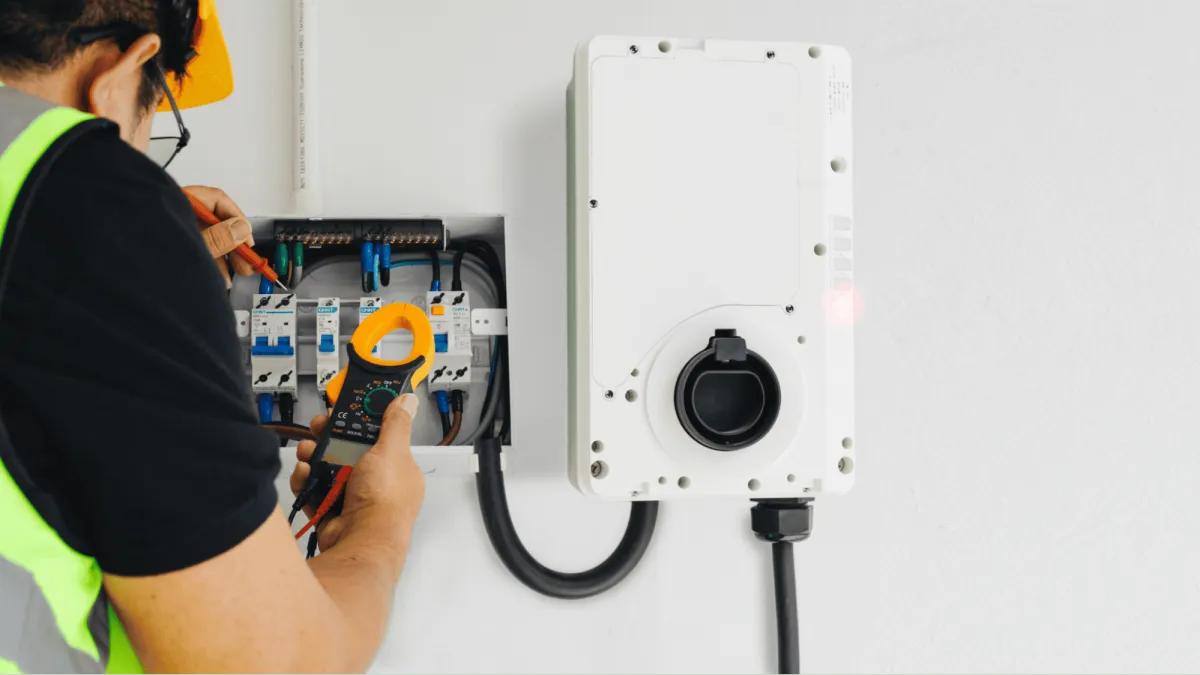Never wait for help. We're available 24/7.
Call Now: 781-782-2382
Never wait for help. We're available 24/7.
Call Now: 781-782-2382

Boston's transportation creates 29% of the city's total emissions. The city needs to switch to electric vehicles to cut down its carbon footprint. Many Boston residents would call it a good move to buy an EV, but charging infrastructure worries hold them back. A professional electrician's expertise becomes vital to install EV chargers at homes and businesses in Boston.
Setting up an EV charger needs more than just plugging in a new device. Massachusetts law demands licensed electricians to handle all EV charging equipment setups. Installation costs range from $100 to over $2,000.
People charge their EVs at home 80-90% of the time. Level 1 systems take 8-30 hours while Level 2 systems need 4-6 hours to charge. The right installation ensures optimal performance and safety.
Let's look at the significance of professional installation, your requirement checklist, and the quickest way to get your EV charging station running safely at your home or business.
Homeowners often think about installing their EV charger to save money. This might seem like a good idea, but the risks are too big to ignore.
High voltage requirements make DIY EV charger installations dangerous. These charging systems use more power than all other home appliances combined. Your safety could be at serious risk if you don't install the system properly.
Poor wiring or using the wrong materials can cause:
Wires to melt and components to break down over time
Parts to overheat when electrical loads get too high
Electric shock risks from bad grounding
These problems are real. Home electrical fires happen about 51,000 times each year. Overheated and stressed electrical loads often cause these fires.
EV chargers fall under the National Electrical Code's continuous load category. This means they run at high power for long periods. Your home's electrical system faces extra strain if you don't install the charger correctly.
Safety isn't the only concern - you could face financial and legal problems too. Boston's building codes are strict, and work without permits might void your homeowner's insurance. This leaves you exposed if anything goes wrong.
Bad installations can also void warranties for your charging equipment and electric vehicle. You'll have to pay for repairs yourself instead of getting warranty coverage.
Insurance companies just need professional electricians to do the installation. Claims might get rejected if the work doesn't meet National Electrical Code standards.
Load calculations are complex but crucial. You need to know if your electrical panel can handle the extra power safely. Most homeowners don't have this specialized knowledge.
Wrong load calculations lead to:
Circuit breakers that trip too often
Dangerous drops in voltage
Electrical components that might overheat
Professional electricians must review your current electrical load before installation. This prevents system failures and fire risks. The total load should stay under 80% of your panel's capacity - this is the 80% rule.
Wrong calculations might mean you'll need expensive electrical panel upgrades later. This is a big deal as it means that you'll spend more than what professional installation would have cost initially.
You just need specialized technical knowledge beyond simple electrical work to install an EV charger. Professional electricians have vital expertise that will give a safe and optimal performance.
Professional electricians do critical load calculations to check if your electrical panel can safely handle an EV charger's power needs. EV chargers work at 100% capacity for long periods as continuous loads. They apply the significant 80% rule to keep your total electrical load below 80% of your panel's capacity. This prevents overheating and system failures.
Certified electricians know how to work with both static and dynamic load management systems:
Static load management uses adjustable setpoints to limit power to a safe level
Dynamic load management creates a digital twin of your electrical system and adjusts energy distribution based on immediate demands
Professional electricians know Boston's unique permitting process and inspection requirements for EV charger installations. Boston requires all Level 2 and DC fast chargers to be UL certified and installed by Massachusetts licensed electricians. They also know Boston's EV Readiness Policy that specifies requirements for new developments.
Professional electricians can assess your specific needs and suggest the best charging solution. They look at:
Your current electrical system's capabilities
Upgrades your electrical system might need
Best spots to place your charger
Right charging level for your vehicle and how you use it
Professional electricians pick the right size wiring and breakers based on amperage requirements. To name just one example, see a 48-amp charger - it needs 6-gage wiring connected to a 60-amp breaker. They know stranded wire works best for pulling through conduit. Hardwiring often beats plug connections for better safety and reliability.
It also makes sure proper grounding techniques and secure connections prevent future hazards. This eliminates the risk of electrical fires from poor installation methods.
Boston has specific requirements you need to know when installing EV chargers. These rules make sure everything stays safe and meets city standards.
You'll need an electrical permit to install any EV charging equipment in Boston. Property owners must submit their applications through the Inspectional Services Department (ISD) Permit Portal. New developments can process the charging station with their base permits. The process starts when you create an account. You must specify that your project involves an Electric Vehicle Charging Station and add details about the core team, work locations, and service information.
The city's Zero-Emission Vehicle Roadmap is 2 years old and pushes for more electric vehicles. The plan requires developments under Transportation Access Plan Agreement to follow Boston's EV Readiness Policy. This means 25% of parking spaces need "EVSE installed" status while the other 75% must be "EV Ready".
Massachusetts state law says city inspectors must check the work within 5 days after completion. They make sure everything follows local and national rules, with secure connections and safe system operation. A professional electrician who knows Boston's inspection standards will give a smooth experience.
You should talk to Eversource, Boston's electric utility provider, before starting the installation. This step becomes crucial if you need service upgrades. Most electricians suggest picking professionals from Eversource's preferred vendor list. This step helps confirm your electrical service can support the extra load and prevents problems later.
All EV charging equipment in Boston must follow these rules:
NFPA 70 and National Electric Code article 625
Massachusetts Electrical Code requirements
UL certification for Level 2 and DC Fast Chargers
Boston wants every resident to live within a 5-minute walk from an EV charger by 2030. The city plans to add eight Level III DC fast chargers and 32 Level II ports in municipal parking lots during 2024.
EV charging installations for homes and businesses differ in many ways that go way beyond the reach and influence of simple electrical needs. These differences affect everything from design to compliance.
Home EV charging stations work at lower power outputs from 3.3 kW to 11 kW, which works great for overnight charging. Business stations, on the other hand, deliver much higher power—between 20 kW and 350 kW. This setup allows faster charging for multiple vehicles throughout the day. The costs reflect this power difference. Home installations usually cost from a few hundred dollars to around $1,500. Business systems can run between $5,000 and $50,000.
Business installations face multiple-user scenarios that don't exist in home setups. Property managers need to choose between shared charging stations (available to all) and private stations (reserved for specific users). Shared systems often make more financial sense at first. You can install fewer chargers than the total number of EV drivers in the building. Private setups guarantee access but need a stronger electrical infrastructure.
Business charging stations need smart billing systems to handle revenue. These systems support:
Multiple billing models (time-based, energy-based, or combined approaches)
Automated pricing based on peak/off-peak hours
Multi-currency support for international businesses
Many businesses now use tiered pricing structures that give discounts for higher usage levels. This approach helps boost EV adoption among company fleets.
Business charging stations must meet Americans with Disabilities Act requirements, unlike home installations. Each accessible EV charging space needs to be at least 132 inches wide and 240 inches long. These spaces also need a 60-inch wide access aisle that runs the full length of the charging space. The spaces must connect to accessible routes that lead to building entrances. Clear signage should mark these spaces.
Professional EV charger installation proves a valuable investment for Boston homes and businesses. DIY attempts might save money initially. However, safety, reliability, and proper compliance make professional installation worth the cost.
Licensed electricians possess technical knowledge and understand local codes. They excel at load management to protect your property and investment. Their work will give a charging system that meets Boston's strict requirements. You'll also keep your manufacturer warranties and insurance coverage intact.
Power requirements and billing systems create a big difference between residential and commercial installations. Qualified professionals know these differences. They help create the right charging solution that matches your needs.
Licensed Boston electricians deliver peace of mind instead of risking safety hazards or code violations through DIY work. These experts make sure your EV charging station runs safely and efficiently. They handle everything from simple home setups to complex commercial charging systems.
Q1. How much does it typically cost to install an EV charger in Boston?
The cost of installing an EV charger in Boston can range from $100 to over $2,000, depending on factors such as the type of charger and the complexity of the installation. Residential installations are generally less expensive than commercial ones.
Q2. Can I install an EV charger myself to save money?
While it may be tempting to install an EV charger yourself, it's not recommended and is actually illegal in Massachusetts. DIY installations pose significant safety risks, including electrical hazards and fire risks. Additionally, improper installation can void warranties and insurance coverage.
Q3. What are the main differences between residential and commercial EV charger installations?
Residential chargers typically have lower power outputs (3.3-11 kW) and are designed for single-user scenarios. Commercial installations often require higher power outputs (20-350 kW), must consider multi-user scenarios, need sophisticated billing systems, and must comply with ADA requirements.
Q4. Do I need a permit to install an EV charger in Boston?
Yes, Boston requires an electrical permit for all EV charging equipment installations. The permit application must be submitted through the Inspectional Services Department (ISD) Permit Portal, and the installation must be inspected once completed.
Q5. What are the benefits of hiring a professional electrician for EV charger installation? Professional electricians bring crucial expertise in electrical systems, load management, and local code requirements. They ensure safety, proper equipment selection, and compliance with Boston's specific installation requirements. Their work also maintains manufacturer warranties and insurance coverage.

Website by GetCharlie.io